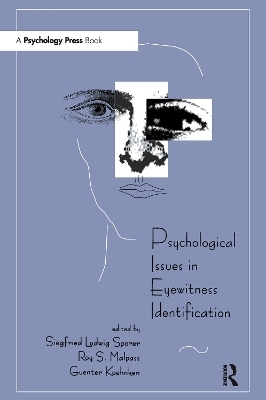
Psychological Issues in Eyewitness Identification
Psychology Press (Verlag)
978-0-8058-1865-9 (ISBN)
Why do police officers, investigators, prosecutors, judges, and others with an interest in eliciting accurate memory-based testimony need to inform themselves of the research literature in experimental psychology that addresses the question of witness memory? The answer is straightforward, from the perspective of a simple cost/benefit analysis. As with so many matters in the administration of public funds, effectiveness holds important rewards. Those who investigate crimes and decide which line of investigation to pursue and which line to postpone or set aside, necessarily make judgments about the likely guilt of suspects based on the information at hand. If they can make these judgments with a high degree of accuracy, everyone benefits.
For many cases eyewitness identification is an important component of evidence, prosecution, and plea negotiation. If witness identification is correctly implemented, investigators and prosecutors can make their judgments effectively, and focus their resources more efficiently. A major component of effectiveness requires avoiding expending scarce resources on erroneous prosecutions. It is in everyone's interest to make the best use of the memory of witnesses: to preserve it without changing it; to render it maximally accessible; to provide an environment in which witnesses feel free to report their recollections; and to accurately assess the probable validity of the witness's report, regardless of the witness's certainty or doubts about its accuracy.
This volume gathers evidence from various research domains on eyewitness testimony. Although many of the studies discussed deal with eyewitness identification, it is noteworthy that many of them also touch upon other areas of concern to eyewitness researchers, including chapters on:
*voice recognition by humans and computers, with particularly detailed instructions on conducting voice "lineup,"
*differential aspects of recognition memory in children,
*elderly eyewitness' memory,
*problems of cross-racial identification,
*psychological aspects of facial image reconstruction techniques,
*person descriptions,
*particular benefits of reinstating context as a means to improve eyewitness memory,
*problems associated with various research paradigms in the eyewitness arena, and
*recommendations on how to conduct lineups and photospreads and their proper evaluation.
Differentiated from other literature on this topic by its non-technical language and accessibility to non-professionals, this volume covers a great deal of ground, raises a host of questions, settles some others, and points the way to more effective use and evaluation of what eyewitnesses have to say.
Siegfried L. Sporer, Roy S. Malpass, Guenter Koehnken
Contents: Preface. S.L. Sporer, G. Koehnken, R.S. Malpass, Introduction: 200 Years of Mistaken Identification. J.P. Lipton, Legal Aspects of Eyewitness Testimony. D.J. Narby, B.L. Cutler, S.D. Penrod, The Effects of Witness, Target, and Situational Factors on Eyewitness Identifications. S.L. Sporer, Psychological Aspects of Person Descriptions. J.W. Shepherd, H.D. Ellis, Face Recall--Methods and Problems. R. Hammersley, J.D. Read, Voice Identification by Humans and Computers. J.E. Chance, A.G. Goldstein, The Other-Race Effect and Eyewitness Identification. R.S. Malpass, Enhancing Eyewitness Memory. G. Koehnken, R.S. Malpass, M.S. Wogalter, Forensic Applications of Line-Up Research. G.M. Davies, Children's Identification Evidence. A.D. Yarmey, The Elderly Witness. A. Maass, Logic and Methodology of Experimental Research in Eyewitness Psychology. R.S. Malpass, S.L. Sporer, G. Koehnken, Conclusion.
| Erscheint lt. Verlag | 12.11.1995 |
|---|---|
| Verlagsort | Philadelphia |
| Sprache | englisch |
| Maße | 152 x 229 mm |
| Gewicht | 453 g |
| Themenwelt | Geisteswissenschaften ► Psychologie ► Allgemeine Psychologie |
| Geisteswissenschaften ► Psychologie ► Test in der Psychologie | |
| Geisteswissenschaften ► Psychologie ► Verhaltenstherapie | |
| Recht / Steuern ► Strafrecht ► Kriminologie | |
| ISBN-10 | 0-8058-1865-0 / 0805818650 |
| ISBN-13 | 978-0-8058-1865-9 / 9780805818659 |
| Zustand | Neuware |
| Haben Sie eine Frage zum Produkt? |
aus dem Bereich


